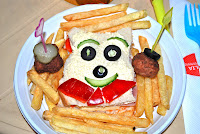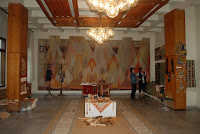
8/31/2010
I celebrated my 24th birthday in Bulgaria last Tuesday. It was wonderful!! I was surprised at the number of birthday wishes I received, both from America and Bulgaria, and felt incredibly loved all day. I think I’ve written about the difference between traditions for birthdays in Bulgaria and America in an earlier entry, but now I have a whole new respect for them.
The custom of treating your friends and family (‘cherpi-ing’), on your birthday makes a lot of sense to me. Instead of spending time and money every time someone else’s’ birthday comes around, surprising them with cake or whatever while trying to be fair and creative, in Bulgaria, your turn to treat is on your birthday (and name day, but that’s a different topic). You can make as big or as little of a day out of it as you choose. Also, it gives everyone who may have let the date slipped their minds a reminder to wish you well. I can’t really imagine this happening since I think the date and year of birthdays comes up in almost every introductory conversation I’ve had, right after the questions about siblings and before the ones on religion.
I brought fudge, rice crispy treats (received marshmallows in a care package and substituted cornflakes), hershey kisses, and coca cola. The ‘American’ sweets were a big hit. The rice crispy treats (I received marshmallows in a care package), were especially popular….and, difficult to explain. Marshmalllows are unavailable here and the word translates as a type of flower. Anyways, it was a great day, I was met in the morning by my coworkers wishes of ‘health, happiness, and luck’ in the coming year were and everyone I encountered wished me well. The girls from camp even put “Chestit Rozden den Megan!!”as their skype statuses (big deal for 7th graders striving to establish their ‘I’m indifferent, yet effortlessly chill images’).
In Other News:
New Friend
The other day an older, raggedy man in his mid-late 70s came into the office I share with three colleagues. He looked like an out of luck panhandler from a large US city, complete with rough clothes and a long grayish-white beard. Appearances aside, he turned out to be a fantastically interesting character and very thoughtful.
As I quickly learned, Nikolai was in town to represent his art on for the opening of the exhibition. He had 20 minutes to fill before the next bus and apparently chose to spend it wandering around the Obshtina. When he learned I was from America, his face lit up. He proceeded to draw me a map of the United States and outlined several states, including Louisiana. His arthritic hands shook severely, but he moved the pin deliberately, saying the names of New Mexico, Nevada, and California while he worked. His mind might be going a bit—he kept trying to speak to me in French even after my colleagues explained I speak Bulgarian and do not understand any French. But, he was able to sharply recall several random words in English (morning, airplane, august, etc.) and wrote on the back of the map.
Several days later…While I was walking to my language tutor’s on my birthday, I recognized a coworker giving direction to a cab driver. I had told Nikolai the date of my birthday during our brief conversation, but I didn’t think anything of it. Birth dates seem to come up frequently when talking to someone for the first time and the Zodiac calendar is a relatively popular diversion among Bulgarians I’ve met. I was completely surprised when the taxi pulled up to the curb and the driver motioned for me to stop and wait. He opened the door and helped the old French-speaking artist step out. Nikolai grasped my hand in both of his, wished me health, happiness, and good luck, gave me a box of candy, and climbed back in the cab to leave.
Fall Now
Winter seemed to arrive this week in Bulgaria with no transition from the intensely hot summer. Last week, I was sleeping without blankets and spent most of my time at home sitting on the tile floor in the kitchen (coolest place). This week, the temperature dipped into the 30s at night. Even though the temperatures haven’t been especially extreme compared to places I’ve been before (80s and 90s doesn’t compare to Louisiana summers and 30s are no where near as cold as upstate NY in the winter), the lack of climate control entirely changes the game. In previous living situations, I’ve always been able to go into a temperature controlled vehicle or building. No more. Although I will have a wood burning stove in my permanent residence, the apartment I currently live in is without any sort of heating element and obviously no air conditioner either. With leaky seals on doors and windows, 30 degrees quickly becomes an extreme temperature.
Melinarka (A raspberry picker)
I’m pretty pleased with the timing of harvests. I was in Kravoder when most of my favorite fruit and vegetables were in season, now they are in season in Chiprovtsi. I get to enjoy them twice.
I went raspberry picking with Yolka this week in her large garden on the edge of town. I know Yolka from the camp I helped with earlier in the summer (she was the amazing cook) and she has a grandson who participates in a lot of the activities around town. She also weaves carpets. Anyways, it was lovely, she sang a song about raspberry pickers (melinarki) and I received a large bag of vegetables and fruit after a few hours of picking/eating raspberries.
I miss working in the garden in Louisiana. What began as an experiment to demonstrate my potential as an agricultural development worker (never appreciated J), turned into a hobby I enjoyed and that gave me great calmness of mind. I hope to help out more in the gardens here more before the final harvest.
Officially, I am here!
After one month and three trips to the office in Montana, I received my lichna carta (Bulgarian ID card)! I feel very official and proud of it. Not that it’s a flattering picture, it’s not, but I feel like I’ve passed some sort of mileston, like when I received my driver’s license after passing a test, except I don’t get to drive and I didn’t have to take a test.











































